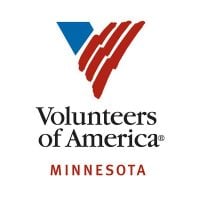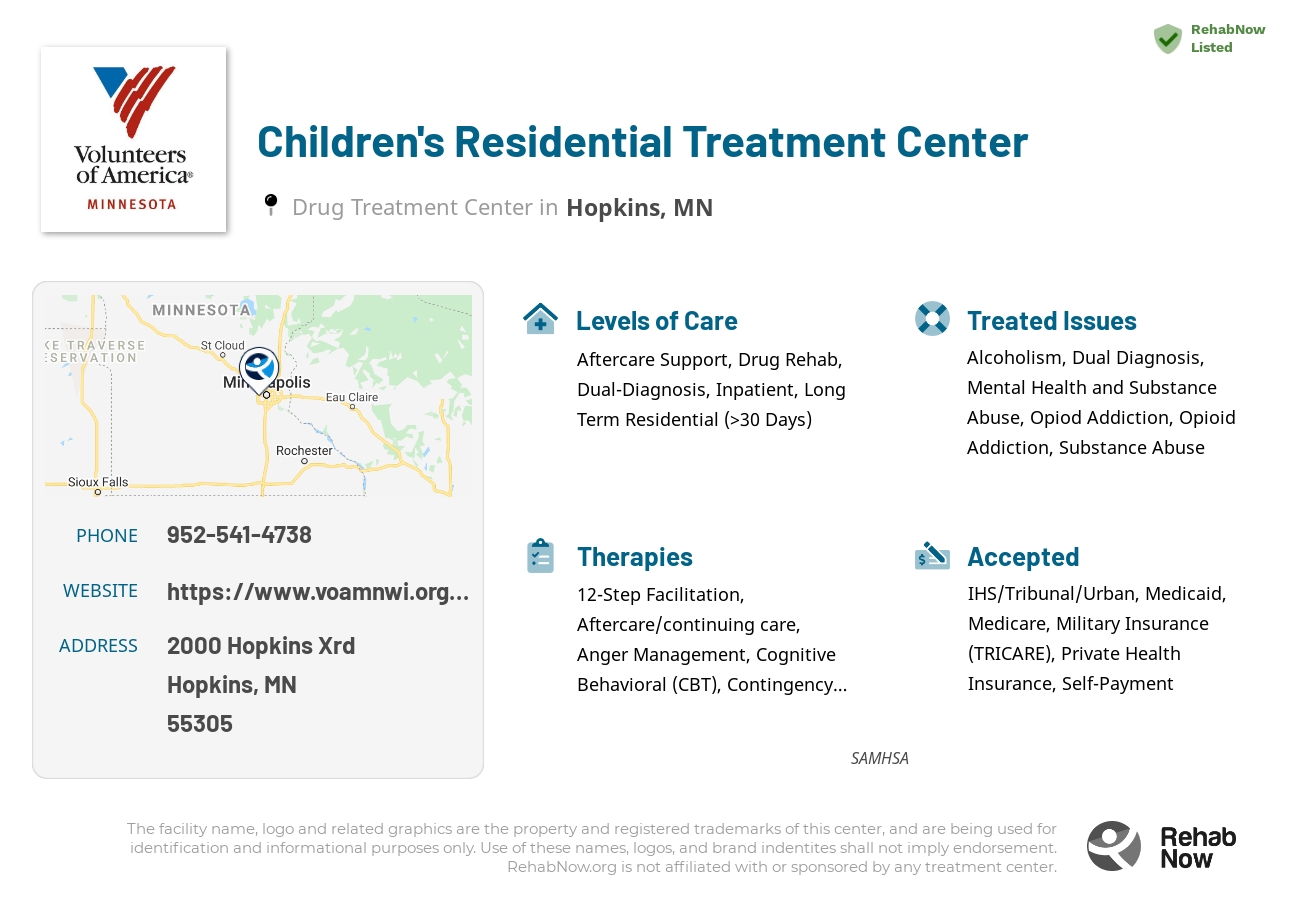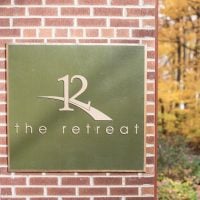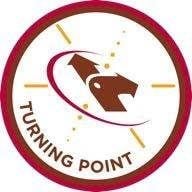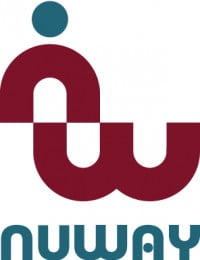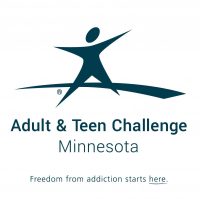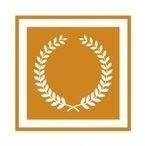Children's Residential Treatment Center
Drug Rehab Center in Hopkins, Minnesota
Children's Residential Treatment Center in Hopkins, MN offers evidence-based treatments and therapies like cognitive-behavioral therapy and family therapy to support individuals struggling with addiction on the path towards long-term recovery.
About This Minnesota Facility
Children's Residential Treatment Center (CRTC) in Hopkins, Minnesota provides intensive residential treatment for severely emotionally disturbed children and adolescents. Nestled in a serene suburban setting, this facility specializes in addressing psychiatric challenges.
• Comprehensive care for mood and anxiety disorders
• Personalized treatment for personality and thought disorders
• Trauma-informed therapies for self-destructive behaviors
• Specialized programs for eating disorders and dissociative conditions
Accredited by SAMHSA and CARF, CRTC upholds the highest standards of care, ensuring a safe and nurturing environment for its residents.
CRTC offers a holistic approach to treatment, addressing a wide range of issues including alcoholism, opioid addiction, substance abuse, dual diagnosis, drug addiction, and mental health concerns. Their multidisciplinary team utilizes evidence-based therapies, such as cognitive-behavioral therapy, dialectical behavior therapy, and trauma-focused interventions. Individualized treatment plans are tailored to meet each resident's unique needs, with a focus on developing coping strategies and fostering personal growth.
Genders
Ages
Modality
Additional
Accreditations
SAMHSA

CARF
The Commission on Accreditation of Rehabilitation Facilities (CARF) is a non-profit organization that specifically accredits rehab organizations. Founded in 1966, CARF's, mission is to help service providers like rehab facilities maintain high standards of care.
Conditions and Issues Treated
The inappropriate use of any drug in Hopkins, MN is substance abuse. This involves alcohol, medications, and illicit drugs. With a combination of physical and psychiatric therapies, drug addiction is successfully treated at Children's Residential Treatment Center. After Detox is complete, individuals follow-up with treatments treating the root cause of the addiction.
Opioid Addiction Treatment supports people recovering from addiction to prescription drugs as well as illegal opioids. This is a hospital-based or residential treatment. Depending upon one’s age, detox without the appropriate medication may be unpleasant or even dangerous–some get body aches, fever, chills, while others may even have seizures.
Opioid treatment involves medically assisted detox, physical and mental support. Most rehabilitations use an array of treatments to ensure overall wellbeing, such as Medication-assisted therapy (MAT) in which one gets behavioral therapy, medicines, and counseling. A client-centered approach can reduce one’s chances of relapse. Therapists at work with the client to figure out environmental and behavioral triggers, giving them the power to change the patterns.
Levels of Care Offered at Children's Residential Treatment Center
This center offers a variety of custom treatment tailored to individual recovery. Currently available are Aftercare Support, Drug Rehab, Dual-Diagnosis, Inpatient, Residential, with additional therapies available as listed below.
An inpatient is a person who stays in a hospital or rehab center during treatment. For alcohol- and drug-dependent individuals, inpatient rehabs provide individualized around-the-clock services. Inpatient treatment programs address a person’s unique physical, medical, and psychological needs. A team of experts assess the severity of the addiction and design a highly tailored program. typically, the length of stay in an inpatient facility in Hopkins, MN is 30 days. Those with severe addiction may need to stay at the facility for 60 to 90 days.
Residential treatment programs are those that offer housing and meals in addition to substance abuse treatment. Rehab facilities that offer residential treatment allow patients to focus solely on recovery, in an environment totally separate from their lives. Some rehab centers specialize in short-term residential treatment (a few days to a week or two), while others solely provide treatment on a long-term basis (several weeks to months). Some offer both, and tailor treatment to the patient’s individual requirements.
Treatment for substance abuse does not cease after an individual successfully completes a detox or rehabilitation program. A vital follow-up treatment service is aftercare support provided to individuals at Children's Residential Treatment Center in Minnesota after they attain initial sobriety.
Aftercare support often takes the following forms: 12-Step Programs, Outpatient Treatment Programs, and Support Groups. The most effective aftercare programs are tailored to meet an individual’s specific needs and circumstances.
Therapies & Programs
Individual therapy involves one on one sessions between the patient and the therapist at Children's Residential Treatment Center. Individual therapy provides patients with a safe environment where they can openly discuss their problems with the therapist. The patients find the therapist as a person who they can trust. It helps them to open up and discuss personal and sensitive issues, which they may not be comfortable discussing in a group setting.
Individual therapy aims to identify the core issues that would have led the patient to substance abuse and address the root cause effectively. The therapist can develop patient-specific customized solutions through individual therapy, which aids speedier recovery.
Addiction and alcoholism always harm an addict’s relationships with others and none more than relationships with a spouse or partner. Couples therapy is an essential part of restoring trust and good communication to intimate relationships harmed by addiction. Couples therapy by Children's Residential Treatment Center helps repair the damage done to these important relationships.
Recovery can be more effective if the entire family’s involved. Family therapy hosted by Children's Residential Treatment Center brings in the addict’s family to explore genetic factors. It gives loved ones the tools for dealing with addiction and its underlying mental issues. It is a recommended step in helping addicts adapt to sober living.
Trauma is one of the most common causes of psychological disorders. It’s often found in people with addiction diagnoses. Trauma therapy addresses this by examining the emotions and thoughts people have formed due to past traumas. Traumas are complex but trauma therapy can reduce their ability to contribute to addictive behaviors.
Dialectical Behavioral Therapy is a form of Cognitive Behavioral Therapy. It is designed for those who are prone to self-harm and suicidal behaviors. Children's Residential Treatment Center aims to help patients understand the relationship between their thoughts, feeling and behaviors and it gives them the tools to make a change. It is effective for those whose addictions and behaviors stem from extreme mental health issues.
Self-defeating thoughts and habits can limit your possible successes. Some examples of this are procrastination, unhealthy eating and angry outbursts. REBT is a method of specific counseling offered by Children's Residential Treatment Center that replaces negative and self-limiting thoughts.
EMDR stands for Eye Movement Desensitization and Reprocessing. It is a treatment method to work through traumatic memories to find resolution. It may involve eye movement, hand tapping or other small movements.
Rehabilitation is not just limited to bringing an individual out of addiction and achieving sobriety. It is considered complete only when an individual starts leading a normal and balanced life. Life skill therapy focuses on the various skills that helps an individual to lead a normal life. Patients often do not take care of themselves, struggle professionally and withdraw from social interaction due to the physical and emotional disturbances caused by addiction.
Life skills therapy helps them to improve various personal, professional and social skills such as cooking healthy meals, maintaining proper hygiene, budgeting, decision making, time management, regulation of emotions and resolving the interpersonal conflicts effectively.
A 12-Step Program is a common method that is used to treat addiction. This format is used for both drug and alcohol treatment. It is extremely popular and successful for large numbers of people and the staff at Children's Residential Treatment Center are trained to assist in 12-step management.
Contingency Management (CM), also known as motivational incentives or prize method, is a behavioral therapy type. It is based on the principle that their consequences influence the behaviors of an individual. So, it promotes the desired behavior by giving rewards while discouraging the unwanted behaviors by withholding the rewards or even by giving punishments. One of the expected desired behavior is the absence of drug in a toxicology screen, and the rewards vary from prize or vouchers, to experiences. CM is used for individuals who need therapy for more than 3 months, and it has the advantage of being implemented by family members.
Payment Options Accepted
For specific insurance or payment methods please contact us.
Is your insurance accepted?
Ask an expert, call (888) 674-0062
Additional Details
Specifics, location, and helpful extra information.
Hopkins, Minnesota 55305 Phone Number(952) 541-4738 Meta DetailsUpdated April 15, 2024
Staff Verified
What else do people call Children’s Residential Treatment Center?
People have occasionally also searched for “Omegon Residential Treatment Center in Minnesota”
Patient Reviews
There are no reviews yet. Be the first one to write one.
Hopkins, Minnesota Addiction Information
Minnesota is fighting an opioid epidemic that is leaving hundreds of its residents dead each year. Both prescription opioids and illicit opioids are widely abused in the Land of 10,000 Lakes. Heroin continues to be one of the most commonly abused drugs in the state, if not the most common illicit drug. Over 10% of all treatment admissions in Minnesota list heroin as their drug of choice.
In 2019, more than 30 people died from a drug overdose in Hopkins, Minnesota. About 9% of Adults in Hopkins are addicted to alcohol. This is thrice the times of car accidents and homicides. The top drugs that cause fatal overdoses are heroin, cocaine, fentanyl, and methadone. There are many different types of drug treatment available at Hopkins. Common types of treatment include inpatient, residential rehab, and outpatient treatment.
Treatment in Nearby Cities
- Onamia, MN (77.5 mi.)
- Faribault, MN (46.9 mi.)
- Park Rapids, MN (156.7 mi.)
- Navarre, MN (9.4 mi.)
- Stillwater, MN (30.6 mi.)
Centers near Children's Residential Treatment Center
The facility name, logo and brand are the property and registered trademarks of Children's Residential Treatment Center, and are being used for identification and informational purposes only. Use of these names, logos and brands shall not imply endorsement. RehabNow.org is not affiliated with or sponsored by Children's Residential Treatment Center.
